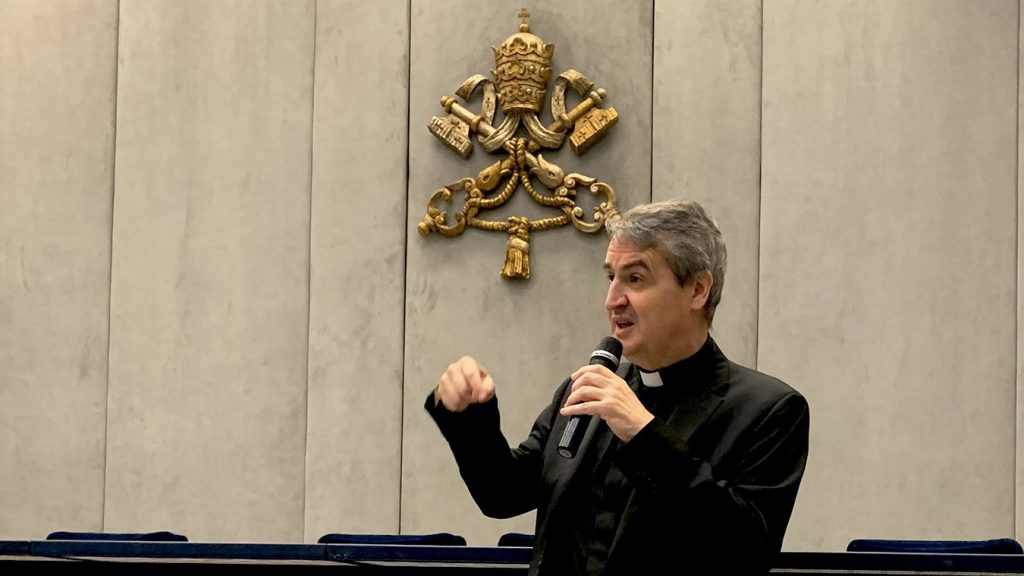With a renewed membership, the Pontifical Commission for the Protection of Minors met at the Vatican in late October and laid the groundwork for devising an annual report on child protection efforts by the Catholic Church globally.
Oblate Father Andrew Small, commission secretary, told reporters Oct. 28 that members also looked at the commission's new relationship to the disciplinary section of the Dicastery for the Doctrine of the Faith and continued their efforts to promote greater transparency and fuller reporting to victims about the outcome of their cases.
"In our engagement with victim survivors, the acknowledgement of the wrong that was done to them is primary, being listened to, being believed," Father Small said. "There's nothing that takes the place of being believed and heard."
But, he said, "seeing the wrongdoer continue to flourish at times or to appear without sanction is also very painful," so victims are understandably confused or upset when they are not informed about actions taken by the church against an accused offender.
Because the commission is not involved in individual investigations and disciplinary procedures, Father Small said he could not comment on the case of Bishop Michel Santier of Créteil, France. When the Vatican announced in 2021 that the bishop was retiring, the bishop had said it was for health reasons. No one contradicted him publicly until mid-October when the Diocese of Créteil confirmed he had been credibly accused of sexual misconduct and disciplined by the Vatican.
The Vatican still needs to find a way to be more open while respecting local laws that protect the reputation of someone who is not guilty of a civil crime but may have violated church law, Father Small said.
If the church cannot figure that out, he said, not only will it be bad for the institutional church, "but it will be continually painful for the victims, who are the source and summit of the commission's focus."
When Pope Francis reorganized the Roman Curia, he linked the commission to the disciplinary section of the Dicastery for the Doctrine of the Faith. Father Small, writing in L'Osservatore Romano, the Vatican newspaper, said the move ensures the commission "would maintain its independence as an advisory body to the pope, with access to the bodies that exercise leadership within the church and with the mandate to oversee the adequacy of the church's policies and procedures in the area of abuse prevention and safeguarding."
So, Father Small wrote, the commission "will continue to be led by a president delegate, appointed by the pope and reporting directly to the pontiff. And decisions regarding the personnel, the members of the commission, as well as the proposals it produces, will remain independent of the dicastery. Pope Francis has been very clear that the independent voices of the members of the commission and those it serves should not be compromised."
U.S. Cardinal Seán P. O'Malley of Boston has been president of the commission since its establishment in 2014.
During the commission's meeting Oct. 27-29, it also announced the launch of a fund to help finance the establishment of "suitable centers where individuals who have experienced abuse, and their family members, can find acceptance and an attentive hearing, and be accompanied in a process of healing and justice, as indicated in the motu proprio 'Vos Estis Lux Mundi.'"
Father Small told reporters that he believed 70 to 80 of the 114 bishops' conferences in the world do not have stable, publicly accessible reporting mechanisms called for in Vos Estis, mainly because they do not have the resources. But with major funding from the Italian bishops' conference and contributions from others, those listening and reporting posts will be established.
As for the annual report on the church's child protection efforts worldwide, a report the pope asked the commission in April to develop, Father Small said commission members outlined a design for the report.
The first section, he said, would summarize reports bishops give to the commission while making their "ad limina" visits to the Vatican regarding their guidelines and implementation of Vos Estis.
For the second section, commission members will divide into teams to look at the church in specific geographical areas, focusing on giving a broader overview of child protection efforts in Africa, in Asia and Oceania, in Europe and in the Americas.
A third section will look at how dicasteries of the Roman Curia are including safeguarding in their activities; for example, how the Dicastery for Clergy promotes safeguarding awareness in seminaries, he said.
The final section will look at broader church efforts to protect children in the world by, for example, rescuing child soldiers, protecting migrant and refugee children, ensuring their safety in orphanages and foster care homes.
While Father Small said the commission should have something to give the pope in 2023, he does not expect to collect enough "actionable data" to begin doing a full annual report until 2024.

